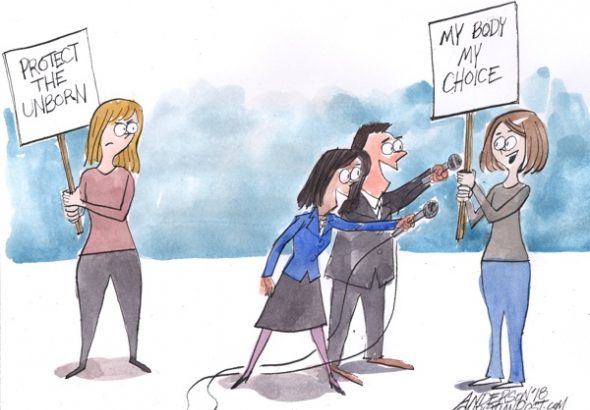The View
The view that an unborn child has the right to life is a view which is shared by millions across the world. You would not think so, listening to some of the media in Ireland at the moment. As long ago as 1924, the Geneva Declaration of the Rights of the Child stated that “the child, by reason of his physical and mental immaturity, needs special safeguards and care, including appropriate legal protection, before as well as after birth”. This statement was repeated in the 1959 UN Declaration on the Rights of the Child and in the 1990 UN Convention on the Rights of the Child. Major international legal instruments like this are important.
In the Universal Declaration of Human Rights, the United Nations proclaimed that childhood is entitled to special care and assistance.
The 1990 UN Convention on the Rights of the Child, signed by 194 countries, said that they were “convinced that the family, as the fundamental group of society and the natural environment for the growth and well-being of all its members and particularly children, should be afforded the necessary protection and assistance so that it can fully assume its responsibilities within the community”.
Development
They also recognised “that the child, for the full and harmonious development of his or her personality, should grow up in a family environment, in an atmosphere of happiness, love and understanding” and that “the child should be fully prepared to live an individual life in society, and brought up in the spirit of the ideals proclaimed in the Charter of the United Nations, and in particular in the spirit of peace, dignity, tolerance, freedom, equality and solidarity”.
The core question for the people of Ireland as they approach the referendum on May 25, 2018 is whether they believe that an unborn child is really a child, or whether it is a nothing, to be disposed of at will. This a profoundly serious question because it goes to the heart of our respect as a people for the dignity and value of all human life. Ireland is at a crossroads. In less than eight weeks the people will go out to vote for or against the repeal of the Eighth Amendment to the Constitution which states that, “the State acknowledges the right to life of the unborn and, with due regard to the equal right to life of the mother, guarantees in its laws to respect, and, as far as practicable, by its laws to defend and vindicate that right”.
If the people of Ireland vote to repeal this part of the Constitution, the government of Ireland has said it will introduce legislation permitting unrestricted abortion during the first 12 weeks of pregnancy.
Science tells us that at 12 weeks an unborn child is fully formed. Its heart is beating, and all the organs, muscles, limbs and bones are formed. The baby’s fingers will soon begin to open and close, her toes will curl, her eye muscles will clench and her mouth will make sucking movements.
This is something of which the proponents of abortion do not speak.
We can look to England Wales and Scotland to see how abortion works there. Last year marked 50 years since the passing of the Abortion Act 1967 – in that time some eight million babies have been aborted.
In 2016 alone 190,406 abortions were carried out. When the Abortion Act was passed it was anticipated that there would be about 5,000 abortions a year.
Under the Abortion Act in 2016, 97% of abortions (180,794) were undertaken on the basis that the continuance of the pregnancy would involve risk, greater than if the pregnancy were terminated, of injury to the physical or mental health of the pregnant woman.
There is no requirement to demonstrate this: two doctors have to sign the forms, yet we know that some doctors will sign those forms with ever seeing the woman. The reality is that abortion is available on demand now in the UK.
We know, too, that in 2016, nine children were aborted because they had a cleft palate, little girls have been aborted because they are the wrong sex, and I heard the other day of a child who was aborted because she had only one hand. Is this what the people of Ireland really want?
Six of the 190,406 abortions were carried out to save the life of the pregnant woman or to prevent grave permanent injury to her physical or mental health.
Abortion is big business in Britain now, worth over £120,000,000 (€137m). Twenty-two employees of Marie Stopes alone were each paid more than £100,000 (€114,000) last year. Its chief executive was paid £420,755 (€481,000) in 2015, including a performance-related bonus of a quarter of a million pounds (€286,000). Another company, BPAS, is led by a chief executive who earned £145,000 (€166,000) in 2016.
So, dowe believe that each baby should be safe in his or her mother’s womb, or do we disregard the child and think only of the mother? It is the safety of the baby in its mother’s womb that is being spoken of when Ireland considers whether to vote to keep, or to repeal, the Eighth Amendment to the Constitution.
Each Irish voter must, surely, consider how in conscience they should vote: whether they vote, effectively, for abortion which is defined by the UK National Health service as “the medical process of ending a pregnancy so it doesn’t result in the birth of a baby”, or whether they vote to protect that baby.
This is not just a matter for women – it is a matter for the whole of society, for men, whether they are fathers or not, for legislators, for Churches, for everyone.
Science has shown that by eight weeks after fertilisation, the unborn child reacts to touch. By 20 weeks the unborn child reacts to stimuli that would be recognised as painful if applied to an adult human. Surgeons entering the womb to perform necessary, corrective medical procedures on unborn children have seen those babies flinch, jerk and recoil from sharp objects and incisions. In addition, it has been known for decades that ultrasound technology shows that unborn babies at 20 weeks and earlier react physically to outside stimuli such as sound, light and touch.
I do not understand how any Catholic could vote to repeal the Eighth Amendment and to allow the introduction of abortion as proposed by the Government. We believe as Catholics that that each baby, each person is sacred, made by God, loved by God. There are no exceptions. If we cease to value human life, what will we hold to be vital and essential? If we pick and choose between individuals on grounds of their status: born or yet to be born, of their age, or disability or anything else, how can we claim to cherish equality? How can we claim to love?


 Nuala O’Loan
Nuala O’Loan
